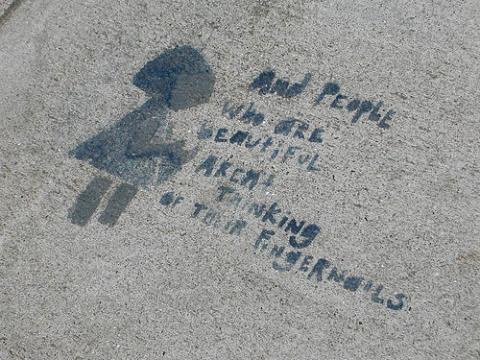When Body Issues Attack, Turn to Feminist Theory
If it's summertime, then it's time for body issues and street harassment. In short -- it's the perfect time to dust off your feminist rage!
Ah, the beginning of summer. Freedom, warmth, sunshine, fresh green
grass…and a certain kind of hell for women with body issues, which
is to say, pretty much all of us. Yes, it’s "bikini-season", and in the few moments when
women are not being exhorted to blast off our newly-exposed cellulite,
the swelter equals street harassment paradise. To make it worse, ice
cream, verboten by conventional diet wisdom, beckons around every corner.
Fortunately, for everything that makes us feel bad about ourselves,
there’s a piece of feminist literature to help remind us that the beauty
culture does not evaluate one individual’s relative worthiness, but rather
acts as a system that afflicts and controls women as a group.
And we are a group.
I’ve listened to fifteen year old girls from impoverished
sections of the Bronx and from fancy buildings on Park Avenue alike who refuse
to eat breakfast because of the calories, but then can’t focus in class
because they’re starving. For all of us, as Courtney Martin says so
well in her book, Perfect Girls, Starving
Daughters, body anxieties
are a waste. Think of the positive energy women young and old alike
could be exerting instead of calculating the calories in our breakfasts
or counting the dimples behind our knees. 
Sin and Redemption
As women deny themselves more and more, junk food starts to beckon like
a forbidden doorway. When we splurge, we often simultaneously calculate
the number of miles we’ll need to put in the next day — or perhaps, just
the number of times we’ll berate ourselves. It makes it hard to enjoy
that cupcake.
This process is described by Naomi Wolf in The Beauty Myth. Wolf posits that for women, the dichotomy
of food consumption and denial has replaced the process of religiously-informed
sexual sin and atonement that once kept women in their place. That moral
control over women’s bodies faded away but it has been replaced with
new set of judgments about what comes in and out of women’s mouths.
If we don’t believe women should be punished for "impure"
thoughts or actions, we shouldn’t buy into the modern edict that eating too
much equals a kind of wantonness. Instead, we should work to avoid
labeling food behaviors with any moral judgment whatsoever.
Popular diet regimen Ultra Slim-Fast is made by Nestle, purveyors of
Crunch bars and other candy. Nestle wants us to have it both ways–eat
crunch bars, feel bad, buy Slim-Fast and then go off the wagon and eat
more Crunch bars.
In other words, capitalism wants us to hate ourselves.
In her book of media criticism, Where the Girls Are, Susan J. Douglas has a chapter about
how capitalism manipulated the rhetoric of feminism to suck women into beauty culture, by advertising beauty products as creating strong,
firm, bodies, and through the rise of the hyper-technical, foreign-word enhanced
labels on skin products (for instance, "advanced biotechnique micro-bead technology
from the doctors at the Weripyouoff institute in Zurich").
The diet industry is a racket, and there’s been great pushback against
it in the blogosphere. If diets worked, we’d all use them, be skinny
and then the companies would go out of business. They’re not that benevolent.
We shouldn’t be going on diets, buying their books, or otherwise indulging
the cycle.
Women’s Bodies as Public Property
"Lookin’ good!"
What woman hasn’t heard these words as she
hurries down the street on a hot day? We all know that being harassed has little to do with whether we are, in fact,
lookin’ good (it happens when we’re wearing sweatpants and tube tops
alike) and all to do with the fact that we appear to be female. In reality,
this kind of behavior is about power and entitlement, not about our
individual bodies. But it can feel humiliating to be singled out in
public that way.
There’s little we can do to combat street harassment on an individual
level other than holla back or ignore it. But it does help to contextualize
what’s happening to us — to remember that in the eyes of many,
women’s bodies are public property. That is why we struggle against violence
and rape, and for our reproductive rights. The idea that a woman’s bodily
integrity is not a basic right is mind-boggling — but then again, street
harassment gives us daily proof.
So the next time someone whistles, we should get mad on behalf of ourselves,
along with the women who have been denied their right to choose and
live freely, who are all suffering under the same weird conception that
our bodies are NOT our own. As the public service announcements on the Boston transit system proclaim, in the voice of a woman who has been harassed on the subway, "I’m not the one who should feel ashamed." Righteous rage feels better than shame.
A Concession to the Patriarchy
Truthfully, it would be hard for many of us to live if we fought off
every single expectation about our appearances. One idea Amanda Marcotte
and Jessica Valenti have articulated in their feminist primers is that instead of castigating ourselves and
each other for occasionally capitulating to the beauty/diet industry,
we have to accept the concessions we make to the patriarchy in order
to survive. For some women, it’s extra time at the gym. For others,
it’s high heels or mascara.
But why not see our choices for what they are — little things that make
us more comfortable in a superficial, sexist world — instead of as "empowering"
or "selling out" or anything else with a value attached to
it?
So this summer, let’s ditch our issues of Shape and Glamour, and pick
up our dog-eared feminist manifestos instead, and help train our minds to reject the ridiculousness of our image-focused
culture.
